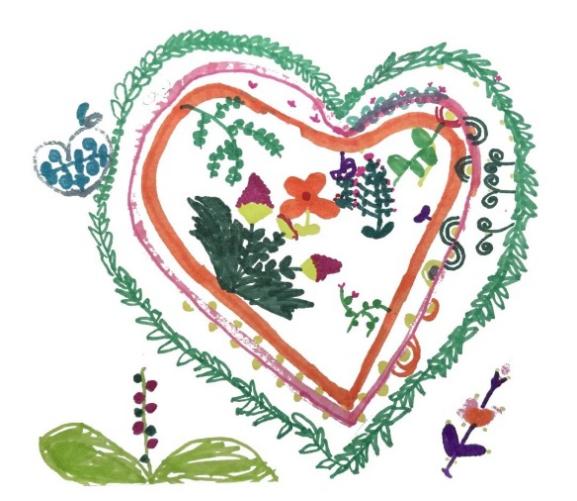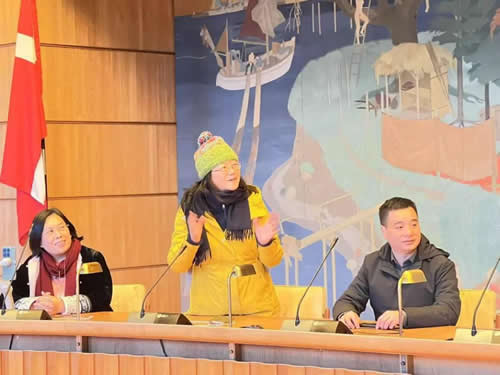
Part.01
Stepping into Another Life: A New Experience of Merging with the World and Oneself
In early December, I traveled to Germany and Denmark. The trip had two purposes: first, to attend the award ceremony for the "Andersen Teacher’s Award," and second, to systematically explore Hans Christian Andersen’s influence on Danish education and experience the beauty of Denmark’s educational philosophy. During my two weeks there, every day was filled with learning and reflection. We discussed fairy tales, education, philosophy, and life, immersing ourselves in a pure, spiritually enriching existence.
Through cultural contrasts and comparisons, I observed how traditions and heritage shape a nation’s collective mindset and educational approach.
In Denmark, the differences between two cultures are palpable yet intangible. They are rooted in a maritime culture, while ours is agrarian; they revere forests, while we cherish cultivation; they value freedom and independence, while we emphasize collective strength; they pursue minimalist artistic expression, while we prioritize practicality; their cultural symbol is the sailboat, ours the harvest; we yearn for stability, while they thrive on creativity "outside the framework"...
Compared to other developed nations I’ve visited, Denmark stands out uniquely. It is one of the world’s most prosperous countries yet remains quietly understated, tucked away in a corner of the globe. It also boasts one of the highest happiness indexes globally. The Danish concept of "hygge" perfectly encapsulates their sense of contentment—a term so distinctive it has been adopted into the Oxford English Dictionary.
HYGGE
Its essence lies in *atmosphere* (dim the lights, light candles), *presence* (disconnect from devices, embrace the moment), *joy* (coffee, cake, chocolate), *comfort* (pause and unwind), a warm cup of coffee, a cozy sweater, gratitude, equality, tranquility, security, and belonging.
Though Danish culture may not dominate global influence, it radiates a uniquely serene, inclusive, and egalitarian charm. As the Danes shared with me: *"The individual over the collective; peace over conflict; unity over division; freedom over restriction; equality over hierarchy..."* This ethos forms their core philosophy.
Yet this nation, which de-emphasizes competition and rejects "meritocracy," has achieved remarkable "miracles": top-tier education, unparalleled citizen happiness, and the world’s highest per capita Nobel Prize rate. What explains this paradox?
Recently, while reading Neil Postman’s *The End of Education*, I encountered a compelling idea: every culture has its own narrative, and within each narrative lies its guiding "god." During my time in Denmark, I became deeply intrigued by the "gods" shaping Danish identity.
Modern Danish education is profoundly influenced by three figures:
1. Hans Christian Andersen– The "God of Literature," whose fairy tales ignite imagination;
2. N.F.S. Grundtvig– The "God of Education," a philosopher-poet who founded Denmark’s folk high schools;
3. Søren Kierkegaard– The "God of Philosophy," pioneer of existentialism and humanistic psychology, who declared: "Every individual is a unique being."
Through literature, education, and philosophy, Danes have built a "spiritual sanctuary" that fosters democracy, equality, and mutual respect. These three luminaries are hailed as the "Three Musketeers of Modern Danish Education."
Danish education, deeply intertwined with its culture, thrives on principles of *freedom*, *natural growth*, *equality*, and *igniting potential*. Their approach offers fresh perspectives for reimagining education worldwide.
Part.02
"Freedom" is the Prerequisite for Obtaining Happiness
As we walked on Danish soil and learned about their education system, we constantly felt a pervasive sense of "freedom." Visiting Danish elementary schools, middle schools, and kindergartens, we saw free students, free teachers, and free principals. This manifests concretely in children’s remarkable authenticity and naturalness—they enjoy not only physical freedom but also freedom of expression.
Principals, too, possess significant autonomy in school governance. Among the many schools we visited, the most memorable was one led by an artist principal. Seashells adorned every windowsill, with each window view and sculpture arrangement radiating refined aesthetic taste. At a school headed by an athlete principal, sports facilities were exceptionally abundant.
Coming from an "exam-oriented nation," our delegation habitually focused on questions like "school assessment mechanisms and evaluation systems." We struggled to comprehend why "Danish students face no exams before 9th grade." We automatically asked: How is student development measured? How are teachers evaluated? How are students selected for advancement?... China’s education system operates through its own framework—what I perceive as layers of "molds" that condition children to live "within constraints," adapting to predetermined structures.
In truth, we are all "people in molds"... The crucial question becomes: How can we carve out greater freedom within these confines? If one cannot feel free in this world, happiness becomes unattainable... And educators devoid of happiness can hardly nurture happy children.
The diverse schools I visited offered profound insights: First, whether principals or kindergarten directors, they must dare to be themselves and uphold their own value judgments. Second, we can create greater freedom within limited spaces. Like Huacao Kindergarten—though operating within the public system—we can still cultivate heightened happiness through creativity. The prerequisite is disenchantment from certain rigid beliefs to attain corresponding freedom.
Freedom isn’t license to act recklessly or disregard rules, but rather preserving a liberated space within one’s spiritual world. Physically constrained, one’s mind can still transcend limitations. In today’s world, such spiritual freedom grows increasingly precious.
Regardless of circumstances, we always retain the freedom to choose our attitudes. For Huacao Kindergarten’s 2025 New Year Temple Fair "Huacao Haven—A Natural Village Here," we adopted a line from *The Peach Blossom Spring*: "As if illuminated by a faint light." This symbolizes our pursuit of "freedom’s essence"—the capacity to radiate inner luminosity through external turbulence.
Part.03
Even a "single square meter" can create a profoundly beautiful "nature"
The Nordic countries boast vast forest coverage, and Denmark has many forest schools and forest kindergartens, each offering exceptionally rich natural environments with expansive spaces that we can hardly replicate. Of course, when art is integrated with nature, the experience becomes even more unforgettable.
Nature provides education with boundless possibilities – classroom learning has its limitations, while nature offers infinite spatial richness.
Though we admire Nordic environments, our inability to possess such vast forests doesn't negate the feasibility of nature education. We can still create abundant natural environments for children, or cultivate an internalized "nature" that transcends physical manifestations.
Though small, Huacaoyuan (Garden of Flowers and Plants) embodies natural essence. With trees, flowers, soil, sand, and flowing water features where breezes ripple the pond's surface... We've crafted a natural poetic space using these elements, shaping an authentically natural garden.
Rather than envying others, we choose to create. While we can't alter macro environments, we can transform our micro environments – our homes, kindergartens, classrooms... making them beautiful in their own right.
Huacaoyuan teachers have created their "one-square-meter" of freedom and joy within classrooms and daily life. Teacher Jiajia cultivates "a square meter of freedom" with fresh flowers, while Teacher Yujie's desk displays energizing stones and shells carrying the essence of mountains, sea, wind, and sunlight... Thus each classroom in Huacaoyuan radiates its unique natural atmosphere.
At Huacaoyuan, we're building a cultural home – simple, poetic, and pure.
Even with just "one square meter",
We can create "freedom",
And forge our own "natural space".
Part.04
"Equality" is not about condescendingly looking down upon others, but rather a profound appreciation.
Denmark's social system pursues equality and is also a high-taxation nation. High-income earners pay substantial taxes, leaving no "poor" in the traditional sense. Everyone receives the same pension after retirement. During our conversations, I asked: "Does this system feel unfair to the 'strong'? They pay more taxes yet receive equal retirement benefits." They responded: "Equality is not fairness, nor is it equal distribution."
Indeed, some may emigrate for this reason—but most return quickly. Danish society lacks the divisiveness bred by competition, instead fostering a democratic, egalitarian atmosphere conducive to human well-being, providing profound security. Thus Danes radiate serenity and contentment.
Danish society emphasizes "equality." We could visit city halls to converse with officials, even dance with parliamentarians...
China’s millennia of feudal history have shaped its current social fabric. Changing mindsets will be arduous and slow. Yet the pursuit of equality can begin with each individual.
In our garden community, all relationships are equal—we simply hold different roles. Security guard Master Yu visits my home; I cook for the gardening staff; Cleaner Auntie Jia teaches me much through her extraordinary vitality and quiet diligence. Her work exudes tranquility, like the "Low-Profile Monk" in Chinese folklore – an unassuming master hidden in plain sight. The spaces she cleans radiate comfort, embodying true *hygge* (a Danish concept of coziness and contentment).
True equality, I believe, is not performative condescension. Forced "leveling" with subordinates still reeks of arrogance. Real equality lies in appreciating the beauty within others.
Part.05
Education is a form of "Enlightenment"
The Danish education system frequently uses the term "Enlightenment" (literally "igniting")—a word every school invokes when describing its philosophy. This concept of enlightenment or inspiration fundamentally represents the ignition of one's inner life.
With Denmark's remarkably relaxed education system, where students face no exams, their mental space remains expansive. Before entering university, Danish students typically experience a Gap Year, during which they explore the world, gaining deeper insights into global diversity than many of us.
This fosters a profoundly positive outcome: students need not exhaust themselves chasing academic accolades but can instead pursue their true passions. It preserves the most precious element of human existence—the "spark of life." Only with this spark can true "ignition" occur.
In Chinese schools, we overemphasize knowledge transmission while rarely contemplating how to ignite others. Here, whether it's myself or fellow educators, we ceaselessly strive to kindle flames within ourselves and others. Our curriculum intentionally designs themes that ignite inner passion and strength.
In kindergartens, I delight in sparking inspiration through diverse methods. For distant friends who cherish gardens and plants, books remain our ignition tools. Words possess enduring power that transcends time and space.
Human existence carries multifaceted meanings. When we ignite others and create beauty for the world, life gains profound value and richness. If educators cannot embrace this belief to kindle flames in others, no amount of "praise" can render such education truly successful...
True growth requires relative freedom—freedom that enables creation. We must liberate our thinking, embrace natural states of being, pursue equality, appreciate others, and ultimately achieve transcendent ignition of the world. This, I believe, constitutes humanity's authentic "path of life's growth."
Part.06
Epilogue
A few days ago, a student who graduated 16 years ago sent his mother to visit me at the kindergarten. He has now become a public police officer, and used his own salary to buy me a gift. I was deeply moved...
Some worry that the beauty of Huacao Kindergarten might not sustain after my departure... In my heart, this garden has always been beautiful. It brought wonderful experiences to every child who ever lived here. As for its impact on this profession? If it has created positive influence, that would be an unexpected bonus rather than our original intention in establishing this kindergarten.
The significance of Huacao Kindergarten may not lie in replication, but in ignition. It has illuminated others, kindled sparks in people - that itself constitutes meaning...
Just like many say we may never visit Denmark in our lifetime - does that make Denmark's existence meaningless to us? This resonates with Liu Yu's preface "How to Reach Denmark" for political scientist Francis Fukuyama's work "Political Order and Political Decay". Here, "Denmark" doesn't specifically refer to the country, but rather a fairy-tale-like state of perfection. "Moving towards Denmark" represents a state of being - with a believing heart, we may eventually reach our "Denmark"...
For this Denmark trip, special thanks must go to Mr. Dong Ruixiang, initiator of the Hans Christian Andersen Teacher’s Award. Mr. Dong's life experiences are remarkably rich, and his life mission is precisely "ignition". Therefore, he has been helping more people approach Denmark and understand the beauty of alternative educational paradigms.
出访丹麦,让我对教育中如何创造出“幸福感”有了更多思考……
胡华
Part.01
走进另一种生活,感受与世界、与自我融为一体的全新体验
十二月初,我去了一趟德国与丹麦,一是受邀参加“安徒生教师奖”的领奖活动,二是较为系统、全面地了解安徒生对丹麦教育的影响,感受丹麦教育的美好。在那里的半个多月,我们每天都在学习、思考,大家谈论童话、教育、哲学、人生,那一段时间,我们过上了一种很纯粹、精神浓度很高的生活。

因为差异与比较,我们能够看见文化与传统是如何影响一个国家的民族心态与教育方式的。
在那里,能强烈地感受到两种不同文化的差异,这是一种看得见也看不见的存在。他们是海洋文化,我们是土地文化;他们热爱森林,我们热爱耕作;他们喜欢自由与独立,我们更强调集体的力量;他们追求艺术表现的简约感,我们更喜欢追求生活中的实用性;他们的文化图腾是帆船,而我们的文化图腾是五谷;我们向往稳定的生活,他们更喜欢“框架”外的创造……
和我以前去过的发达国家相比,丹麦无疑是独特的。它是世界上最发达的国家之一,但却很低调,静悄悄地隐身于世界一隅,它也是全球幸福指数最高的国家之一。关于丹麦人的幸福感,有一个丹麦语“HYGGE”很贴切地表达出了他们的感受。这个丹麦语的词汇也被纳入了牛津词典。
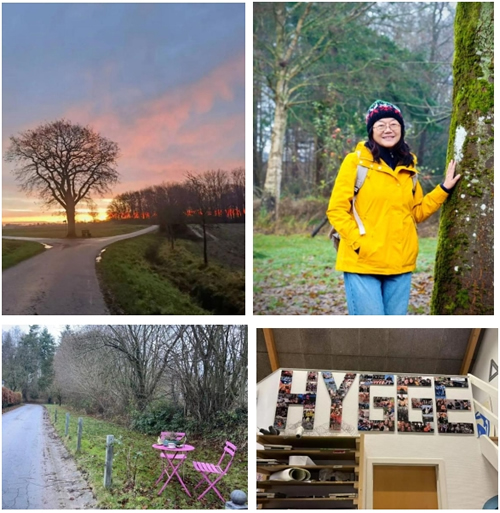
HYGGE
其关键词是氛围(关上灯,点起蜡烛)、静心(关掉手机,体会当下)、愉悦(咖啡、蛋糕、巧克力)、舒服(休息一下,放松自己)、一杯热咖啡,一件宽毛衣,感恩、平等、平和、安全感、归属感等。
丹麦文化对世界的影响力并不是很强,但是它却展现出了另外一种迷人的风采,它似乎更平和、更宽容、更友善,人与人之间也更平等。“个人高于集体;和平好过战争;融合好于分裂;自由高于限制;平等高于权利……”这是他们向我们表达的一个核心理念。
但就是这样一个不强调竞争,不追求“优绩主义”的国家却创造出了很多“奇迹”,教育水平高,国民幸福指数高,人均诺贝尔的获奖率是全世界最高的。这背后的原因是什么?
最近一直在读尼尔·波兹曼(Neil Postman)的《教育何用》,它谈到这样一个观点:每个民族都有自己的叙事,每个民族的叙事中都有自己神灵(god)。在丹麦考察期间。我对丹麦人的叙事神灵产生了浓厚的兴趣。
近现代的丹麦教育深受三个人的影响:一是安徒生(Hans Christian Andersen),他是充满了童话想象的“文学之神”;第二个是格隆威(Grundtvig N.F.S),他是丹麦著名的思想家、教育家、诗人,被称为“民众高等学校之父”,是“教育之神”;第三个是克尔凯郭尔(Soren Aabye Kierkegaard),他是现代存在主义哲学的创始人,也是现代人本心理学的先驱,是“哲学之神”。“每个人都是独立的个体”这句广为人知的话就是他提出的。
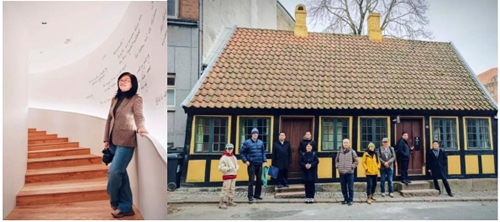
丹麦人用文学、教育、哲学构建了一个民族的“精神神殿”…… 这也奠定了丹麦文化民主、平等、相互尊重的传统。他们三位也被称为近现代“丹麦教育的三剑客”。
丹麦的教育深受其文化的影响。“自由”“自然”“平等”“点燃”是丹麦教育的精髓所在。这些认识也为我们的教育提供了一种全新的思考空间。
Part.02
“自由” 是获得幸福感的前提
当我们行走在丹麦的土地上,了解他们的教育时,无时无刻不在感受着一种“自由”。
走进丹麦的中小学、幼儿园,看到这里的学生是自由的,老师是自由的,校长也是自由的。具体的表现形式是孩子非常真实、自然。他们不仅有身体的自由,更有表达的自由。
当然,校长也有很大的办学的自由。我们参观了很多学校,其中印象最深刻的是一个艺术家做校长的学校。窗台上摆满了贝壳,每一个窗景,每一个雕像的摆放都有很高的审美情趣。在一个运动员做校长的学校里,体育设施就非常的丰富。
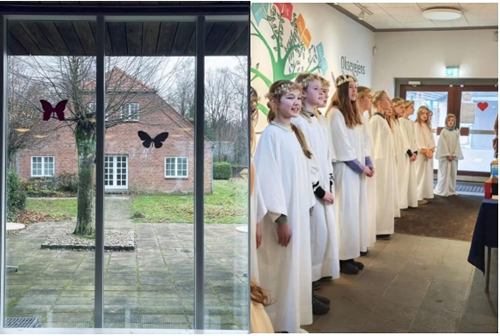
来自“考试大国”的我们,通常最关心的问题是“学校的考试机制与评价体系”,也很难理解为什么“丹麦学生在9年级之前没有考试”?我们会习惯性问,如何衡量学生的发展水平?怎么评价、考核教师?怎么择优录取学生……中国的教育有一套自己的系统,在我看来,它很像是一个个的“套子”,我们总是让孩子生活在“套子之中”,去适应这些“套子”。
其实,我们都是“套中人”……如何在“套”中给自己更大的自由空间?一个人活在这个世界上,如果感觉不到自由,幸福感就无从谈起……而不幸福的教育工作者很难带出幸福的孩子。
我参观的不同的学校就有不同的样貌,这给了我一些启发:一是,校长也好,园长也好,要敢于做自己,有自己的价值判断;二是,我们可以在有限的空间里创造出更大的自由。就像花草园一样,虽然我们是一所体制内的幼儿园,但依然可以依靠自己的创造获得更大的幸福感。前提是你要对一些东西祛魅,才能帮助你获得相应的自由。
自由不是想干什么就干什么,或者无视规则,而是在精神世界里能给自己保留一块自由的空间。对于个人来讲,如果身体上的自由有限,但至少精神可以超越身体获得一定的自由。也许在今天,精神上的自由愈加可贵。
无论在何种情况下,我们都有选择自己态度的自由。花草园2025年新年庙会“花草源——这里有一个自然村落“的纪实推送,我们用了《桃花源记》中的一句话“仿佛若有光”。这是我们追求的一种“自由感”,在任何情况下都能够穿透一些外在的影响,透出自身的光芒。
Part.03
即使“一平米”也能够创造出足够好的“自然”
北欧的森林覆盖面积很大,丹麦也有很多森林学校与森林幼儿园,每间学校都有特别丰沛的自然环境,空间非常大,这是我们难以企及的。当然,如果自然中再有艺术的话,则更让人难忘。
自然为教育提供了一个更广阔的空间,在教室里的学习是有天花板的,而在自然里,空间是丰富的。
我们很羡慕北欧国家的环境,但我们不可能像他们那样拥有大片的森林,这是否意味着自然教育就没有实施的可能性呢?我们依然可以为孩子们创造出丰富的自然环境,或者说创造出一个心中的“自然”,而不仅仅是外显的“自然”。
花草园虽小,却很有自然感。园子里有树,有花有草,有土有沙,还有一组水系,风吹过的时候,小池塘的水面波光粼粼……我们用这些自然物创造出了一种自然的意境,营造出了一个非常自然的花草园。
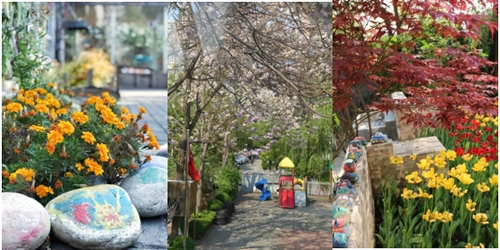
与其羡慕别人,不如自己创造。我们没有办法改变“大环境”,但是我们可以改变身边的“小环境”,比如自己的家,自己的幼儿园,自己的班级……我们可以把它营造得非常美好。
花草园的老师们就在自己的教室或者生活里,创造出了属于自己的那“一平米”的自由和快乐。佳佳老师通过买花为自己创造出“一平米的自由”,玉洁老师的办公桌上摆满了充满能量的石头、贝壳,有山的味道、海的味道、风的味道、阳光的味道……所以,当你走进花草园的班级,每个班的自然的感觉都是不一样的。
在花草园,我们给自己建造一所文化的房子,这所房子是朴素的、诗意的,也是纯粹的。
哪怕只有“一平米”,
我们也能创造出“自由”,
创造出属于自己的“自然空间”。
Part.04
“平等”不是居高临下的俯视, 而是一种深深地欣赏
丹麦的社会制度追求平等,它也是一个高税收国家,收入高的人需要纳很高的税,所以这里也没有真正意义上的“穷人”,所有人退休之后,拿到的退休工资都是一样的。
在我们和他们交流的时候,我问了这样一个问题,这样的社会制度,“强者”会不会觉得不公平?因为他们交了更多税,但是退休后拿到的钱却是一样的。他们说,平等不是公平,也不是平分。确实有这种情况,有的人可能会因为这个原因移民去其他国家。但是,很快就会回来。因为丹麦社会没有因竞争而产生的割裂感,社会营造的民主、平等的氛围是有利于人生存和生活的,它提供了一种安全感。所以丹麦人很平和,总能自得其乐。
丹麦社会强调“平等”。我们也可以走进市政厅,和他们交流,也可以和议员一起跳舞……
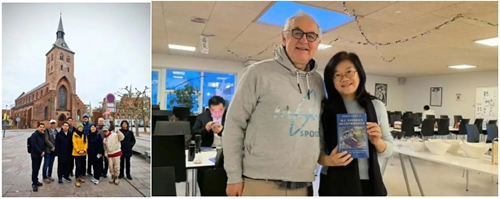
中国社会几千年的封建制导致了现在这样一种社会形态,要从观念上改变,是一件很难且漫长的事情。但追求平等这件事,人人可以从自己做起。
在花草园里,所有人的关系都是平等的,我们只是承担的工作不同而已。保安于师傅可以去我家做客,我喜欢做饭给花草园的姑娘们吃,我从清洁工小贾阿姨身上学到了很多,她是一个生命力特别顽强的人,工作的时候很安静,就像“扫地僧”一样,所以她打扫过的地方会呈现出一种舒适感,这很“HYGGE”!
我想,“平等”不是一种姿态上的平等,如果刻意地俯下身对下属表达一种“平等”,这里面还是有一种傲慢。平等是用欣赏的眼光看到他人身上美好的东西。
Part.05
教育是一种“点燃”
丹麦教育中有一个高频词叫“点燃”(Enlightenment),每一个学校介绍自己的时候都会用到这个词。这个词也有启蒙、启发的意思,我们要给别人某种启发,这个启发本质上是对内在生命的一种点燃。
因为丹麦的教育体制非常宽松,学生没有考试,所以他们的精神空间比较放松。丹麦的学生在上大学之前,都会有一个Gap year(间隔年),他们会在那个时候去看世界,所以他们对世界多样性的了解比我们更多。
这带来了一个非常积极的东西,就是学生可以不用为了在学校体系中取得一个好的成绩而花费太多时间,而可以去追求自己真正热爱的事情。它保留了一个人生命原初状态中最有价值的东西,那个就是“生命的火种”,这是非常宝贵的。有了火种,才有可能被“点燃”。
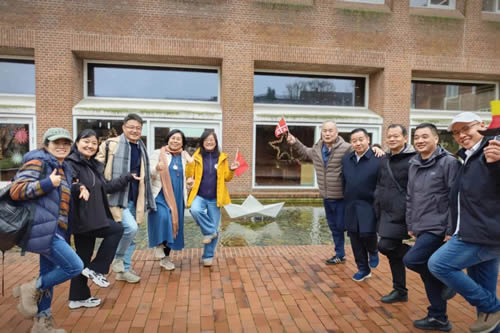
在中国的学校里,我们总是过于强调知识的传授,很少思考如何去点燃别人。在这里,无论是我还是老师们,无时无刻不在点燃着自己与他人。我们的教育中设计了非常多能够点燃内心热情、内心力量的课程主题。
在幼儿园里,我喜欢用自己各种各样的方式去点燃周围的人。对于远方喜欢花草园的朋友们,我们依然可以用书籍来点燃。文字是有力量的,它的力量是可以穿越时间和空间而存在的。
一个人来到这个世界上,有很多生命的意义。当我们能够点燃他人,给世界创造美好的时候,生命也变得越有价值,愈加丰满。如果教育工作者不能用这样的信念去点燃他人,我觉得这样的教育无论获得了怎样的“赞许”,都不能说是成功的……
一个人的成长要拥有相对的自由,这个自由是可以创造的。你要让自己的思想自由一点,生命状态自然一点,你要追求平等,去欣赏他人,然后要有一个更大的超越,去点燃这个世界。我觉得这是一个人真正的“生命成长之路”。
Part.06
写在最后
前几天,一位毕业了16年的小朋友委托他的妈妈来幼儿园看望我,他现在成为了一名人民警察,用自己的工资为我买了一份礼物,我特别感动……
有人担心,因为我的离去,花草园的美好难以为继……在我心中,花草园一直都是美好的,它为曾经在这里生活过的每个孩子都带去了美好的体验。至于为这个行业带来了什么?如果为大家带来了积极的影响,那也是预料之外的事情,并不是我们办园的题中之义。
花草园存在的意义也许并不在于复制,而是点燃。它照耀过别人,它点亮过他人,这就是一种意义……
就如同很多人说,我们也许一辈子都不去丹麦,那么丹麦的存在对我们来说还有意义吗?这一点很像刘瑜在为斯坦福大学政治学家弗朗西斯·福山的著作《政治秩序与政治衰败》序言《如何到达丹麦》里写的那样,在这里,“丹麦”不是特指丹麦这个国家,而是指一种美好如童话的状态。“走向丹麦”是一种状态,只要有一颗心,总有一天可以抵达“丹麦”……
这次的丹麦之行要特别感谢安徒生教师奖(Hans Christian Andersen Teacher’s Award)的发起人董瑞祥先生。董老师的生命经历特别丰富,他的生命使命就是“点燃”。所以,他一直在让更多的人走进丹麦,了解另一种教育形态的美好。
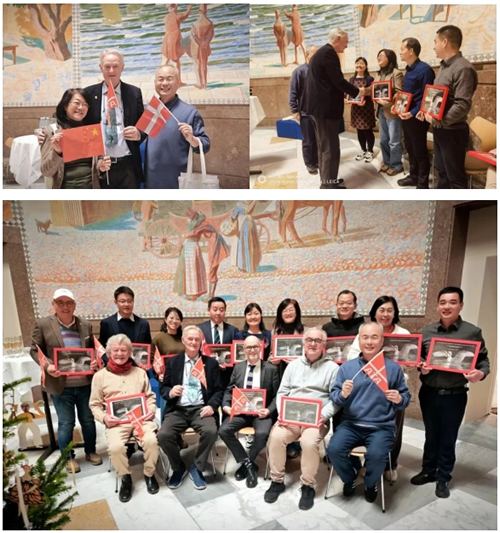
我们在美丽的“安徒生博物馆”接受“安徒生教师奖”的颁奖
